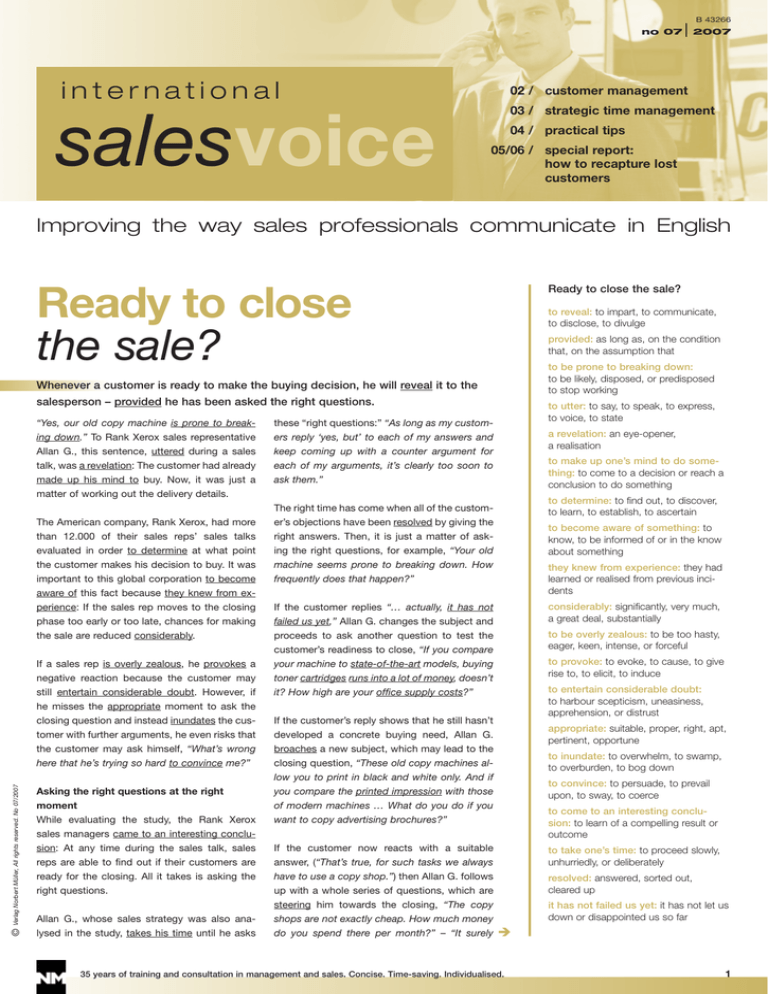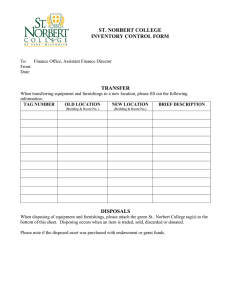
B 43266
no 07 2007
international
salesvoice
02 / customer management
03 / strategic time management
04 / practical tips
05/06 / special report:
how to recapture lost
customers
Improving the way sales professionals communicate in English
Ready to close
the sale?
Ready to close the sale?
to reveal: to impart, to communicate,
to disclose, to divulge
provided: as long as, on the condition
that, on the assumption that
to be prone to breaking down:
to be likely, disposed, or predisposed
to stop working
Whenever a customer is ready to make the buying decision, he will reveal it to the
salesperson – provided he has been asked the right questions.
“Yes, our old copy machine is prone to breaking down.” To Rank Xerox sales representative
Allan G., this sentence, uttered during a sales
talk, was a revelation: The customer had already
made up his mind to buy. Now, it was just a
matter of working out the delivery details.
The American company, Rank Xerox, had more
than 12.000 of their sales reps’ sales talks
evaluated in order to determine at what point
the customer makes his decision to buy. It was
important to this global corporation to become
aware of this fact because they knew from experience: If the sales rep moves to the closing
phase too early or too late, chances for making
the sale are reduced considerably.
©
Verlag Norbert Müller, All rights reserved. No 07/2007
If a sales rep is overly zealous, he provokes a
negative reaction because the customer may
still entertain considerable doubt. However, if
he misses the appropriate moment to ask the
closing question and instead inundates the customer with further arguments, he even risks that
the customer may ask himself, “What’s wrong
here that he’s trying so hard to convince me?”
Asking the right questions at the right
moment
While evaluating the study, the Rank Xerox
sales managers came to an interesting conclusion: At any time during the sales talk, sales
reps are able to find out if their customers are
ready for the closing. All it takes is asking the
right questions.
Allan G., whose sales strategy was also analysed in the study, takes his time until he asks
to utter: to say, to speak, to express,
to voice, to state
these “right questions:” “As long as my customers reply ‘yes, but’ to each of my answers and
keep coming up with a counter argument for
each of my arguments, it’s clearly too soon to
ask them.”
a revelation: an eye-opener,
a realisation
to make up one’s mind to do something: to come to a decision or reach a
conclusion to do something
to determine: to find out, to discover,
to learn, to establish, to ascertain
The right time has come when all of the customer’s objections have been resolved by giving the
right answers. Then, it is just a matter of asking the right questions, for example, “Your old
machine seems prone to breaking down. How
frequently does that happen?”
to become aware of something: to
know, to be informed of or in the know
about something
they knew from experience: they had
learned or realised from previous incidents
considerably: significantly, very much,
a great deal, substantially
If the customer replies “… actually, it has not
failed us yet,” Allan G. changes the subject and
proceeds to ask another question to test the
customer’s readiness to close, “If you compare
your machine to state-of-the-art models, buying
toner cartridges runs into a lot of money, doesn’t
it? How high are your office supply costs?”
to be overly zealous: to be too hasty,
eager, keen, intense, or forceful
to provoke: to evoke, to cause, to give
rise to, to elicit, to induce
to entertain considerable doubt:
to harbour scepticism, uneasiness,
apprehension, or distrust
If the customer’s reply shows that he still hasn’t
developed a concrete buying need, Allan G.
broaches a new subject, which may lead to the
closing question, “These old copy machines allow you to print in black and white only. And if
you compare the printed impression with those
of modern machines … What do you do if you
want to copy advertising brochures?”
If the customer now reacts with a suitable
answer, (“That’s true, for such tasks we always
have to use a copy shop.”) then Allan G. follows
up with a whole series of questions, which are
steering him towards the closing, “The copy
shops are not exactly cheap. How much money
do you spend there per month?” – “It surely
appropriate: suitable, proper, right, apt,
pertinent, opportune
to inundate: to overwhelm, to swamp,
to overburden, to bog down
to convince: to persuade, to prevail
upon, to sway, to coerce
to come to an interesting conclusion: to learn of a compelling result or
outcome
to take one’s time: to proceed slowly,
unhurriedly, or deliberately
resolved: answered, sorted out,
cleared up
it has not failed us yet: it has not let us
down or disappointed us so far
Ë
35 years of training and consultation in management and sales. Concise. Time-saving. Individualised.
Being present
without pressuring
Salespeople who put their customers under pressure and push them to make the
buying decision, attain only short-term success, if any at all. It’s much more likely
that the customer will not buy in the first place or regrets his purchase afterwards.
Sales experts agree: One of the most important
success factors for sales representatives is their
presence with the customer. This applies especially to acquiring new customers, “If you let
more than 15 days go by between the initial and
the follow-up appointment, you are banished
from the customer’s mind,” explains Michael
Weber, Sales Manager Germany for Viessmann,
Allendorf.
More often than not, this presence with the customer is mistaken for applying massive pressure.
Instead of showing an interest in the customer
and taking his needs seriously, he is pressed towards a decision. This starts as early as scheduling the appointment, says telephone trainer
Klaus-J. Fink from Bad Honnef, “If the appointment is forced on the customer, he develops a
feeling comparable to buyer’s remorse.”
Offer benefit
Offering benefit instead of applying pressure
is the most promising way to go. On the one
hand, sales reps should allow their customers
enough free space so they won’t feel pressured
but on the other hand convey to them that they
always will be there for them and advise them
competently in all important matters.
For example, it is especially beneficial to the
customer, if the sales rep makes the transition
to the new supplier as easy as possible, “This
entails, for example, the sales rep programming
all the important contact numbers into the customer’s telephone system,” explains Michael
Weber. Moreover, conducting extensive user
workshops for customers and supporting them
in all technical matters are decisive factors in
retaining your customers.
Being present without pressuring
to put someone under pressure: to
put the screws on or hassle someone
to push someone to do something: to
impel, goad, induce, or exhort someone
to do something
to attain: to reach, to achieve, to accomplish, to obtain, to arrive at, to earn
to regret: to be unhappy with, to be remorseful about, to feel sorry about
to apply especially to: to be particularly
relevant, pertinent, or significant to
to be banished: to be eliminated, dismissed, or removed
is mistaken for: is confused with, mixed
up with, or misinterpreted as
to be forced on someone: to be
pushed on someone, to be thrust down
someone’s throat
buyer’s remorse: purchaser’s regret,
sorrow, or contriteness
to offer benefit: to provide advantage,
to give assistance, to furnish gain
the most promising: the best, the most
favourable, auspicious, or positive
free space: leeway, freedom, flexibility,
room to manoeuvre
to convey: to communicate, to express,
to put across, to make known, to impart
transition: change, switch, conversion,
changeover, shift
this entails: this involves, requires, calls
for, or necessitates
decisive: important, key, significant, crucial, critical, deciding, determining
to retain: to keep, to preserve, to keep
possession of, to keep hold of
Ready to close the sale?
(continuation)
state-of-the-art: up to date, modern,
advanced
cartridge: cassette, container
to run into a lot of money: to be quite
expensive or costly
If the customer’s answers show how very dissatisfied he is with his current situation, Allan G.
asks the all-important closing question, “Then
it would be much quicker and cheaper if you
could do such print work on your own copier. If
you were able to save 20 percent of your printing costs, would that be a reason for you to substitute your old black and white copy machine
for an efficient colour copier?”
If Allan G. is dealing with especially sceptical
customers, he uses “closed” questions exclusively, which the customer can only answer with
“yes” or “no.” Examples: “With your old copy
machine, one copy costs … cents, with a new
one only … cents. Isn’t that a considerable difference?” – “Isn’t it aggravating that your copy
machine breaks down regularly?” – “The repair
costs are surely running high?”
The basic idea behind this procedure: Each
“yes” from the customer brings the sales representative nearer to his final closing question.
Then, it’s only a formality for the customer to
say “yes” and sign the order.
to broach: to bring up, to introduce,
to raise, to mention, to open
printed impression: print image, printed
design
to steer: to guide, to manoeuvre,
to lead, to direct
associate: assistant, staff member
to carry out: to fulfil, to complete,
to execute, to finish
to substitute for: to replace with, to exchange for, to use instead of, to switch
with
exclusively: solely, only
aggravating: frustrating, irritating,
annoying, getting on one’s nerves
Verlag Norbert Müller, All rights reserved. No 07/2007
costs you a lot of time to take the material there
and pick it up again. How long does it take your
associate to get to the copy shop and back?”
– “How much time does it take your copy shop
to carry out your order?”
©
Ë
office supply costs: expenses for place
of work resources
Diligence and consistency lead to success
Successful time management demands two things: A clear, realistic strategy and
consistent implementation.
In practice, strategic time management is implemented only sporadically. But as long as
salespeople aren’t clear about what their priorities are and as long as they don’t determine
concretely what is really important and takes
precedence, they will not even attempt to tackle
certain projects.
One typical example, noted by Dr. Ewald Lang,
trainer and management consultant from Munich, is the acquisition of new customers. Prospecting demands a great deal of time and effort
and takes a while till success ensues. Therefore,
one is greatly tempted to return to short-term
“success” by continuing to generate sales with
the existing customers.
However, to set clear priorities means making a decision, which is best done together with the sales
manager within the target agreement. The closer
the communication and the more regular feedback
is given, the better the sales manager will be able
to support the sales force in reaching their goals.
For example, if there is an agreement that the sales
rep wins over a certain number of new customers
and if this goal has top priority, it clearly has to
show up in the time management planning.
Assign priorities to all upcoming activities, for example prospecting, recapturing lost customers
and servicing current customers. Then, allot percentages to your priorities in accordance with
how much time you want to spend on each task. It is important that your planning be realistic:
Fixed appointments and time periods, for example recurring weekly meetings, consultations
with the internal sales force, office work, etc. have to be determined as fixed time blocks. Then,
determine the time you want to spend on the individual priorities. This may, for example, result
in the following weekly schedule: 2 days for prospecting, 0,5 days for recapturing lost customers, 1,5 days for attending to current customers. The extra day, for example, could be your
office day on which, of course, you’ll be also integrating your tasks.
It is important that you inform your colleagues about your fixed times and days. For example, the
internal sales force or the call centre, which schedules your appointments, needs to know which
days are open for visiting potential customers and which day you have designated to be your office day.
©
Verlag Norbert Müller, All rights reserved. No 07/2007
on simple virtues, such as diligence, consistency,
and discipline.
Conclusion: “A diligent salesperson will always
achieve better results – even if he may not be a
‘natural sales talent.’ The more consistent and disciplined he sticks to his set objectives, the more
successful he will be,” says Dr. Ewald Lang.
Know what’s stopping you
The best time management is useless if “something always keeps cropping up.” Dr. Ewald
Lang summarises the reasons why we often
procrastinate:
n If the goal is still a long time away, actions­
are moved to the back burner. Solution:
Move up the dates for action or commit
diligence: assiduity, industriousness,
heedfulness, laboriousness, conscientiousness
consistency: constancy, steadiness,
stability, dependability
to demand: to require, to need, to necessitate, to call for, to involve
implementation: fulfilment, execution,
carrying out, realisation
to take precedence: to come first,
to take priority, to be considered most
critical
to attempt: to try, to make an effort,
to endeavour, to strive, to venture
to tackle: to busy oneself with, to apply
oneself to, to take on, to get to work at
to ensue: to follow, to develop, to come
to pass, to occur, to happen, to transpire
to be greatly tempted: to be very much
at risk, provoked, or enticed
target agreement: contract on objectives or goals
to assign: to allocate, to dole out,
to distribute, to dispense, to apportion
Assigning priorities
After all the tasks have been planned and scheduled, the next step is the most important one: the
implementation. In this case, success depends
Dilligence and consistency lead
to success
yourself to partial steps and goals and control if the partial goals have been reached.
nThe fear of tackling something new. Solution: Consider what would be the worst that
could happen and then put the worst case
in relation to the actual experience.
nThe fear of failing and experiencing defeat. Solution: Make it clear to yourself that it is much
worse not to do anything. Only this is defeat.
nClinging to what you are familiar with because you know that you can do it well.
If things have gone well so far, you lack
the motivation to make changes. Solution:
Make it clear to yourself that new goals
open new perspectives.
nA lack in motivation – there are no (negative)
consequences if you do not tackle the task.
Therefore, one doesn’t do anything about it
and everything goes on as it did before. Solution: Accept motivational incentives, e.g. along
the lines of variable remuneration.
to recapture: to bring back, to return
with, to go and get, to get hold of
to allot: to apportion, to allocate,
to designate, to give, to appropriate
in accordance with: in agreement, conformity, or compliance with
recurring: repeated, habitual, regular,
continual, returning
to attend to: to take care of, to deal
with, to give one’s attention to
simple virtues: straightforward merits,
assets, or good qualities
to stick to one’s set objectives: to
adhere to one’s determined goals or
targets
to keep cropping up: to continue to
happen, to get in the way, to occur,
to turn up
to procrastinate: to postpone or delay action, to move action to the back
burner
to commit oneself to: to promise, obligate, or dedicate oneself to
partial: fractional, limited, fragmentary
fear of failing: worry about not succeeding, falling short, or not making the
grade
to experience defeat: to encounter setback or disappointment
to cling to: to stick to, to hold to,
to abide by, to adhere to
to lack the motivation: to not have, be
deficient in, or be short of the enthusiasm
along the lines: within the framework or
bounds, in the context
remuneration: compensation, salary,
payment
Tips for taking notes at seminars
10-minute check
Tips for taking notes at seminars
Gerhard Reichel from the Institute for Rhetoric in Forchheim provides guidance on
how to take the strain off your memory when taking notes during lectures or seminars and how to better understand and grasp the contents.
1. Pay attention to the notes’ outer form.
nUse loose sheets, preferably in the DIN A4 format.
nWrite only on the front of the page.
nNumber the pages all the way through.
nOn each page, write a keyword, for example the subject or the lecturer’s name.
2. Do not try to write down everything word for word. Better:
nOnly note the most important thoughts.
nUse your own words but be careful not to distort the meaning.
nUnderline important statements or emphasise them in another way.
to take notes: to write down comments, remarks, or observations
to provide guidance: to give assistance, advice, help, direction, or instruction
to take the strain off one’s memory:
to ease the stress of trying to recollect
lecture: talk, speech, address, discourse
to grasp: to comprehend, to see the
point of, to follow, to take in, to realise
contents: subject matter, material, substance, gist
sheet: piece of paper, leaf, page, folio
3. Use common abbreviations.
nOmit superfluous letters: For example, “inv.” instead of “invoice,” “sit.” instead of
“situation,” etc.
nWhen editing your notes, complete abbreviations that are not clear.
nUse signs and symbols that are useful once you analyse and evaluate your notes,
for example, ? = is that really true, !! = important, S = summary.
4. While taking notes, remain an active listener.
nAsk questions as often as you find it necessary or if something is not clear to you.
nIf it’s not possible to ask questions during the lecture or only afterwards, jot them down
so you can ask later.
preferably: if possible, by preference,
from choice, much rather
keyword: catchword, cue, header,
headword, entry
to distort: to misinterpret, to interfere
with, to twist, to alter, to change,
to falsify
meaning: sense, signification, message,
import, drift, gist, essence, connotation
to emphasise: to highlight, to stress, to
accentuate, to underscore, to call attention to
common: usual, customary, standard,
normal, conventional
abbreviation: shortened form, contrac-
www.verkaufspower.de
Haben Sie Fragen an die Redaktion:
International Sales Voice
Tel. 089/54852-8526
Fax 089/54852-8528
redaktionVNM@sv-corporate-media.de
www.salesvoice.com
Do you have a comment or question about
the use of terms in ISV? If so, please send it
to E-Mail: susicu39@aol.com
tion, abridgment
salesvoice
to omit: to leave out, to pass over, to
international sales voice
is published monthly by Verlag Norbert Müller,
a subsidiary of sv corporate media GmbH,
Emmy-Noether-Str. 2E, 80992 Munich,
phone: +49-89-54852-8526
fax: +49-89-54852-8528
ISSN 1615-0619
superfluous: unneeded, extra, not re-
publisher: Verlag Norbert Müller
editor-in-chief: Dr. Bianca Turtur
translator: Theresa Cullison
conceptual design: dworak&kornmesser, atelier für kommunikationsdesign, München
design:abavo GmbH,
D-86807 Buchloe
print: Druckerei Vonroth & Vogel,
D-86899 Landsberg
© Verlag Norbert Müller, All rights reserved.
35 years of training and consultation in management and sales. Concise. Time-saving. Individualised.
skip, to exclude, to fail to mention
quired, spare, excess, unessential
letter: alphabetical character, sign,
symbol
to edit: to check over, to correct, to revise, to amend, to tidy up, to modify
to complete: to add to, to fill in, to add
the final touch to
to remain: to continue to be, to keep on
being, to persist in being
Verlag Norbert Müller, All rights reserved. No 07/2007
Informieren Sie sich auch über
unsere anderen Beratungsbriefe im
Bereich Management, Vertrieb und
Verkauf unter:
international
©
Leserservice
international
salesvoice
Improving the way sales professionals communicate in English
no 07 2007
Vokabelerklärungen Englisch – Deutsch
Ready to close the sale?
to reveal
verraten
provided
vorausgesetzt
to be prone to
breaking down
reparaturanfällig sein
to utter
to put someone
under pressure
auf jemanden Druck
ausüben
äußern
to push
­someone to do
something
jemanden zu etwas
drängen
a revelation
eine Offenbarung
to attain
erreichen
to make up
one’s mind to do
something
sich dafür entscheiden,
etwas zu tun
to regret
bereuen
to apply especially to
besonders gelten für
to determine
ermitteln
to be banished
verbannt sein
to become aware
of something
sich einer Sache bewusst
werden
is mistaken for
wird verwechselt mit
they knew from
experience
sie hatten die Erfahrung
gemacht
to be forced on
someone
jemandem heineingedrückt
werden
buyer’s remorse
Kaufreue
considerably
erheblich
to offer benefit
Nutzen bieten
to be overly
zealous
vorschnell handelnd sein
the most promising
der erfolgversprechendste
to provoke
provozieren
free space
Freiraum
to entertain considerable doubt
erhebliche Zweifel hegen
to convey
vermitteln
transition
Umstellung
appropriate
passend
this entails
dazu gehört
to inundate
eindecken
decisive
wesentlich
to convince
überreden
to retain
binden
to come to an
interesting conclusion
zu einem interessanten
Ergebnis kommen
to take one’s
time
sich Zeit lassen
resolved
aus dem Weg geräumt
it has not failed
us yet
Verlag Norbert Müller, All rights reserved
state-of-the-art
©
Being present without
­pressuring
es hat uns bisher noch
nicht im Stich gelassen
modern
Diligence and consistency
lead to success
to stick to one’s
set objectives
sich an seine gesteckten
Ziele halten
to keep cropping
up
dazwischen kommen
to procrastinate
etwas aufschieben
to commit oneself to
sich verbindlich festlegen
auf
partial
Teil…
fear of failing
Angst zu versagen
to experience
defeat
eine Niederlage erleben
to cling to
festhalten an
to lack the motivation
keine Motivation haben
along the lines
im Rahmen
remuneration
Vergütung
Tips for taking notes at
seminars
to take notes
schriftliche Notizen machen
to provide
guidance
eine Anleitung geben
to take the
strain off one’s
memory
sein Gedächtnis entlasten
lecture
Vortrag
to grasp
erfassen
contents
Inhalte
sheet
Blatt
diligence
Fleiß
preferably
am besten
consistency
Konsequenz
keyword
Stichwort
to demand
erfordern
to distort
verfälschen
implementation
Umsetzung
meaning
Sinn
to take precedence
Vorrang haben
to emphasise
hervorheben
common
allgemein üblich
abbreviation
Abkürzung
to omit
weglassen
superfluous
überflüssig
letter
Buchstabe
to edit
überarbeiten
to complete
ausschreiben
to remain
bleiben
cartridge
Kassette
to attempt
versuchen
to run into a lot
of money
sehr ins Geld gehen
to tackle
in Angriff nehmen
office supply
costs
Verbrauchsmittelkosten
to ensue
sich einstellen
to be greatly
tempted
sehr versucht sein
to broach
anschneiden
target agreement
Zielvereinbarung
to assign
vergeben
printed impression
Druckbild
to steer
hinsteuern
to recapture
zurückgewinnen
associate
Mitarbeiter
to allot
zuteilen
to carry out
erledigen
gemäß
to substitute for
ersetzen durch
in accordance
with
recurring
wiederkehrend
exclusively
ausschließlich
to attend to
betreuen
aggravating
ärgerlich
simple virtues
einfache Tugenden
international sales voice
is published monthly by Verlag Norbert Müller,
a subsidiary of sv corporate media GmbH,
Emmy-Noether-Str. 2E, 80992 Munich,
phone
+49-89-5 48 52-8526,
fax
+49-89-5 48 52-8528,
ISSN 1615-0619
© Verlag Norbert Müller, All rights reserved.
35 years of training and consultation in management and sales. Concise. Time-saving. Individualised.
international
salesvoice
Improving the way sales professionals communicate in English
special report
no 07 2007
How to recapture
lost customers
Customer, come back!
In her newly published book Come back! How to
recapture lost customers Anne Schüller shows
the five steps to recapturing lost customers
quickly and successfully. The book also devotes
a section to the prevention of customer loss.
The start
©
Verlag Norbert Müller, All rights reserved
Customer revitalisation management starts
where all retention measures have failed, which
means that the customer has officially terminated the business relationship or left tacitly. According to loyalty marketing expert Anne
Schüller, two aspects arise from this:
4Cancellation management: the objective is
to ward off cancellations or induce customers to withdraw them.
4Revitalisation management: the objective is
to resume business relationships which had
discontinued or had fizzled out.
to recapture: to bring back, to win
back, to regain, to recover, to reclaim
him to evade taking personal responsibility.
However, if you don’t know the real reasons you
are not able to plan and implement corrective
measures.
To be successful, it is critical to be aware of customers’ expectations; customers, who just left,
to devote: to assign, to allot, to set
aside, to offer, to dedicate
retention measures: preservation or
maintenance actions
to have failed: to have been unsuccessful, fallen through, or not succeeded
are very helpful in pointing out your company’s
strengths and weaknesses. It is important to
pay close attention to the cancellation notices
and to keep an eye on the complaint statistics.
Of course, your company should also conduct
customer surveys on a regular basis.
to terminate: to end, to stop
to leave tacitly: to go away quietly,
to depart without saying a word
to arise from this: to appear, surface,
evolve, or emerge from this
objective: goal, intention, purpose
to ward off: to repel, to repulse, to keep
at bay, to fight off, to fend off
Anne Schüller’s practical tips for conducting
a customer survey:
It is crucial to find out immediately which customer left, for what reasons and how to go
about recapturing that customer in order to
do better the second time around. Schüller
presents the customer revitalisation management in five steps:
1.Identification of the lost or “sleeping”
customers
2. Analysis of the reasons for loss
3.Planning and implementation of regaining measures
4. Result checking and optimisation
5. Prevention
4Which goals are to be achieved by conducting the survey?
4What exactly do you want to know from the
lost customers?
4Which customers are to be asked? – Do
you ask them for their permission to do the
survey so they don’t feel like you throw them
a curve?
4Which survey method is suitable? Who will
conduct it? Has it been ensured that this
method brings relevant results?
4How will the results be processed, interpreted and presented? Who will receive them?
4Who is in charge of making the necessary
action plans? Who implements them? Who
controls them?
4How do customers find out about the improvement processes?
Find out the true reasons
Hard and soft
The author points out that the true reasons for
losing a customer are often emotional ones.
Rarely is customer loss a matter of price. “Too
expensive” is a wonderful pretext for both sides:
It’s an easy way out for the customer because
he doesn’t have to give any reasons and is not
pushed to disclose his “emotional pain,” as
Schüller describes it. For his counterpart on the
selling side, it is convenient because it allows
There are obvious and measurable complaints,
which are the “hard” facts, such as:
4wrong or missing information
4waiting periods are too long (telephone,
etc.)
4delivery or installation periods are too long
4lacking adherence to delivery dates
4poor or deteriorating product or service
quality
to withdraw something: to take something back, to retract something
to resume: to start again, to recommence, to restart, to take up again
to discontinue: to stop, to come to a
halt, to be terminated or broken off
to fizzle out: to peter out, to fold,
to flop, to fall through
to be crucial: to be critical, essential,
important, or key
the second time around: at the next try
or attempt
implementation: execution, carrying
out, enforcement
pretext: excuse, alleged reason, pretence, cover
to disclose: to reveal, to make known,
to divulge, to impart
pain: hurting, suffering, unhappiness
to be convenient: to be opportune,
useful, or favourable
to evade: to avoid, to dodge, to shake
off, to sidestep
expectations: outlook, viewpoint­­
strengths and weaknesses: good and
bad points, positive and negative sides
cancellation notice: letter of annulment,
termination, or cessation
complaint: criticism, grievance, statement of dissatisfaction
Ë
to conduct: to carry out, to do
survey: opinion poll, review, analysis
35 years of training and consultation in management and sales. Concise. Time-saving. Individualised.
special report
According to Schüller, the soft factors are intangible and much more connected with the
customers’ expectations.
The following soft factors may lead to losing
customers:
4not enough contact; the customer feels he’s
been forgotten
4the contacts’ impolite and unfriendly behaviour
4lack of responsiveness to and interest in the
customers’ needs
4not enough flexibility (possibly because of
administrative structures)
4discord between salesperson and customer
or frequent change of contacts
4poor complaint management
etc.
After the analysis, recapturing measures need
to be finalised quickly.
4Which customer is to be recaptured?
4Who is to approach the lost customers?
4What do we offer them?
to recapture
to devote
retention measures
to have failed
to terminate
to leave tacitly
to arise from this
objective
to ward off
to withdraw something
to resume
to discontinue
to fizzle out
to be crucial
the second time
around
implementation
pretext
to disclose
pain
to be convenient
to evade
expectations
strengths and weaknesses
cancellation notice
zurückgewinnen
widmen
Kundenbindungsmaßnahmen
erfolglos geblieben
sind
beenden
stillschweigend verlassen
ergeben sich daraus
Ziel
abwehren
etwas zurücknehmen
wieder aufnehmen
abbrechen
einschlafen
entscheidend sein
im zweiten Anlauf
Umsetzung
Vorwand
offen legen
Verletztheit
bequem sein
vermeiden
Vorstellungen
Stärken und
Schwächen
Kündigungsschreiben
4When will that happen?
4How much of the budget is available for
this?
4What is the concrete course of action?
permission: consent, authorisation, goahead, agreement, okay
In the next step, customers are segmented into
profitable and unprofitable ones. After a great
deal of preparatory work, measures have to be
scheduled – in Schüller’s view, communication
is the central tool for approaching lost customers. She rates verbal communication much
higher than the written one. Following, the success hierarchy:
4personal conversation
4telephone conversation
ensured: made sure, made certain,
guaranteed, warranted
4letter, offer, mailing
4e-mail, text message
After the measures have been finalised, the results and success rates are to be determined.
Schüller, Anne: Come back! 233 pages,
ISBN 978-3-280-05242-6, Zürich 2007,
Euro 26,50.
error in invoicing
to be intangible
connected with
impolite
responsiveness
discord
to approach
is available
preparatory work
tool
to rate
processed: sorted out, handled, managed, dealt with
to be in charge of something: to be responsible or accountable for something
obvious: clear, palpable, noticeable, visible, discernible, recognisable
measurable: assessable, estimable, appraisable, fathomable
lacking adherence to delivery dates:
failing to distribute merchandise on time
or punctually
deteriorating: worsening, declining, going downhill, weakening
breach of agreements: breaking, violating, or contravention of contracts
error in invoicing: mistake, inaccuracy,
or miscalculation in billing
Reading Tip:
complaint
to conduct
survey
permission
to throw someone a
curve
ensured
processed
to be in charge of
something
obvious
measurable
lacking adherence to
delivery dates
deteriorating
breach of agreements
to throw someone a curve: to take
someone unawares, to throw someone
off their guard
Reklamations…
durchführen
Befragung
Einverständnis
jemanden überrumpeln
sichergestellt
aufbereitet
verantwortlich sein
für etwas
sichtbar
messbar
mangelnde Termintreue
nachlassende
Nichteinhaltung von
Vertragsvereinbarungen
Fehler bei der Rechnungsstellung
nicht greifbar sein
verknüpft mit
unhöflich
Einfühlungsvermögen
Disharmonie
ansprechen
steht bereit
Vorarbeit
Instrument
einschätzen
to be intangible: to be impalpable or
untouchable
connected with: linked to, associated
with, related to
impolite: rude, ill-mannered, bad-mannered, discourteous, ungracious
responsiveness: receptiveness, sensitivity, openness, reaction
discord: friction, disagreement, difference of opinion, dissension, conflict
to approach: to speak to, to talk to, to
get in touch with, to make contact with
is available: is to be had, is on hand, is
obtainable, is existing
preparatory work: preliminary, introductory, or basic effort
tool: instrument, resource, vehicle, catalyst, channel
to rate: to regard, to esteem, to value
international
salesvoice
international sales voice
is published monthly by Verlag Norbert Müller,
a subsidiary of sv corporate media GmbH,
Emmy-Noether-Str. 2E, 80992 Munich,
phone: 4 49-89-5 48 52-8526,
fax: 4
49-89-5 48 52-8528,
ISSN 1615-0619
© Verlag Norbert Müller, All rights reserved.
35 years of training and consultation in management and sales. Concise. Time-saving. Individualised.
Verlag Norbert Müller, All rights reserved. No 07/2007
4breach of agreements
4errors in invoicing
etc.
©
Ë





